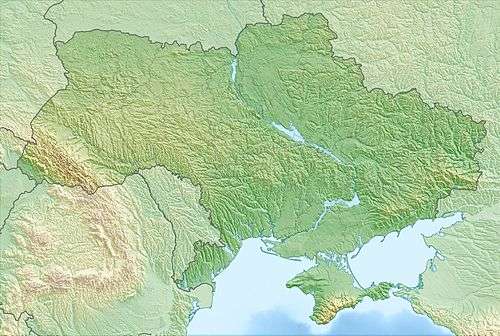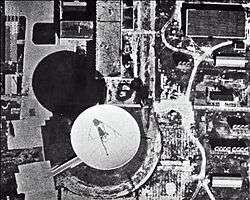Yevpatoria RT-70 radio telescope
.jpg) | |
| Observatory |
RT-70 |
|---|---|
| Location(s) | Yevpatoria |
| Coordinates |
45°11′N 33°11′E / 45.19°N 33.19°ECoordinates: 45°11′N 33°11′E / 45.19°N 33.19°E |
| Organization |
Roscosmos State Space Agency of Ukraine |
| Observatory code |
255 |
| Wavelength | 0.1 cm (300 GHz)-6 cm (5.0 GHz) |
| Built |
1973 |
| Telescope style |
RT-70 Radio telescope |
| Diameter |
70 m (229 ft 8 in) |
| Collecting area |
2,500 m2 (27,000 sq ft) |
| Website |
lfvn |
 Location of Yevpatoria RT-70 radio telescope | |

The Yevpatoria RT-70 radio telescope (P-2500, RT-70) is an RT-70 radio telescope and planetary radar at the Center for Deep Space Communications, Yevpatoria, Crimea. In the scientific literature is often called Evpatoria Planetary Radar (EPR).

With its 70-meter antenna diameter, it is among the largest single dish radio telescopes in the world. It has an advantage in comparison with other large radio telescopes in the fact that the complex includes powerful transmitters that allow active space experiments. Powerful electromagnetic beams can be accurately targeted and the signals received can be analyzed. For this reason, the Yevpatoria RT-70 radio telescope is one of only two in the world that are able to transmit messages to extraterrestrial civilizations, i.e. the multiple Cosmic Calls, Teen Age Messages or AMFE. Radio telescopes are highly sensitive detectors of signals from outer space.
The radiotelescope is depicted on Russia's commemorative 100-ruble banknote of 2015.[1]

Missions
The telescope has participated in Soviet space program since 1978 for the exploration of deep space:
- Venera 11 and Venera 12
- VLBI Salyut 6 KRT-10 radio observatory — RT-70
- Venera 13, Venera 14, Venera 15, Venera 16
- Vega program
- Astron
- Phobos program
- Granat
- Interball
- Fobos-Grunt (in 2011)
- Spektr-R
In 1999, 2001, 2003, 2008, transmit messages to extraterrestrial civilizations:
Radar studies of planets and asteroids. Observatory code 255 (Evpatoria).
- 4179 Toutatis
- 6489 Golevka (the name 'Golevka' comes from the first few letters of the names of three observatories: GOL-EV-KA = GOLdstone-EVpatoria-KAshima).
- (33342) 1998 WT24
- (101955) 1999 RQ36
See also
- Goldstone Deep Space Communications Complex
- Galenki RT-70 radio telescope – at the Ussuriysk Astrophysical Observatory
- Suffa RT-70 radio telescope – at the Suffa Radio Observatory
- Complex “Pluton-M” – at Center for Deep Space Communications